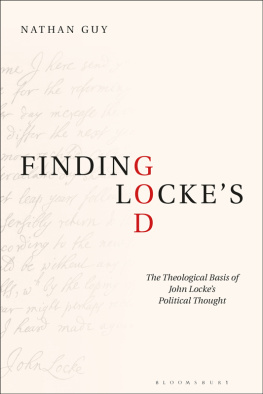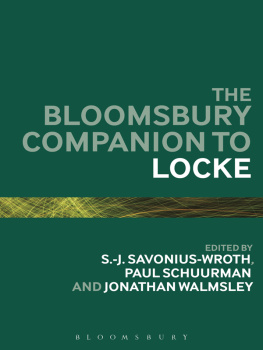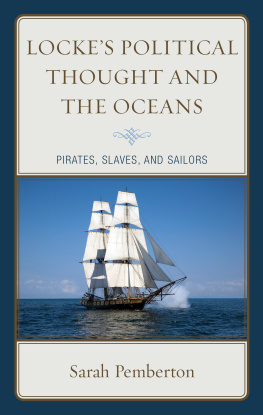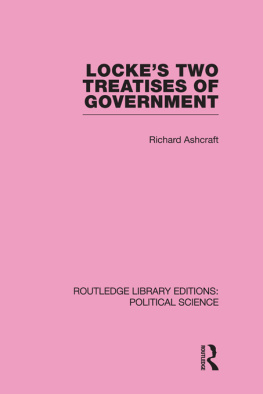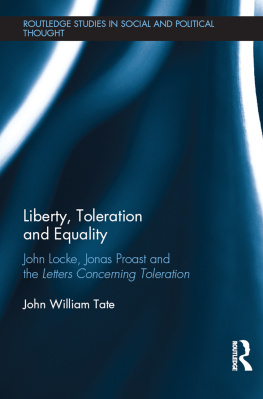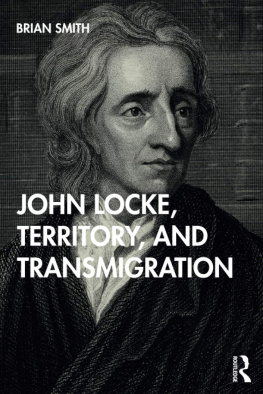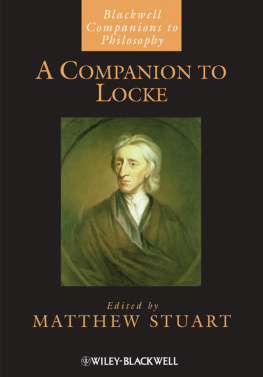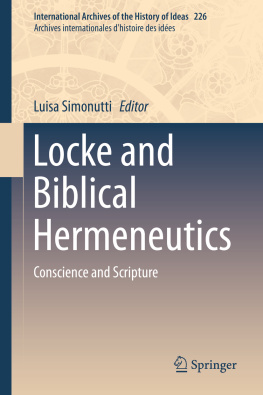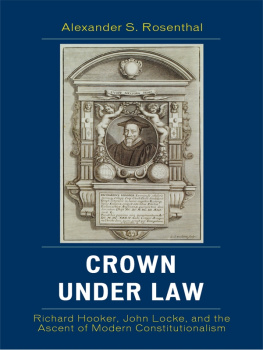Finding Lockes God
Also available from Bloomsbury
Intellectual, Humanist and Religious Commitment, by Peter Forrest
Kants Transition Project and Late Philosophy, by Oliver Thorndike
Religious Language, Meaning and Use, by Robert K. Bolger and Robert C. Coburn
Spinoza in Twenty-First-Century American and French Philosophy, edited by Jack Stetter and Charles Ramond
Finding Lockes God
The Theological Basis of John Lockes
Political Thought
Nathan Guy

For Katie
To form a young gentleman as he should be [involves] an art not to be learnt nor taught by books. Nothing can give it but good company and observation joind together.
John Locke, Some Thoughts Concerning Education (1692), 93.
I am extremely grateful for the good company of family, educators, colleagues, and friends who have shaped not only my thinking but also my life. The initial impetus to read Locke came nearly a decade ago through a series of engaging lectures and conversations at the London School of Economics and Political Science (LSE). Alex Voorhoeve, Luc Bovens, Katrin Flikschuh, and Paul Kelly all had a hand in raising my interest, while my friend and classmate Garnett Genuis encouraged me to turn my interest into a larger project. The idea for this book began to take shape a few years later while conducting research in the Theology faculty of the University of Cambridge. I found myself surround by good company who modeled a perfect blend of erudition, generosity, and refined grace. I think especially of Andrew Davison, Douglas Hedley, Janet Soskice, and the late and lamented John Hughes. My gratitude belongs to St. Edmunds College, Cambridge, not only for providing an ideal living and learning environment for three wonderful years but also for awarding me the John Coventry Prize for my work.
The funding for my years in England came through the generosity of Harding Universitys executive committee. My special thanks belong to this good company of executives, especially David Burks, Bruce McLarty, and Mike Williams.
Returning home from the UK, I enjoyed the good company of kind and generous souls who volunteered their time to aid me in my further research and preparation. I wish to thank the able librarians at Harding University (especially Justin Lillard, Holly Tidwell, and Emillia Cline), the students of my Locke Seminar; my colleagues Mac Sandlin, Jim Bury, and Jordan Guy for their careful and critical eye; and two graduate students from Harding School of Theology who lent their invaluable assistance: Lance Hedrick and Jackson House.
In preparing my research, I had the good fortune to present my findings and hone my argument through various presentations at Pepperdine University, Faulker Universitys Jones School of Law, Heritage Christian University, and Harding University. To all those involved in providing these opportunities (especially Layne Keele, Joshua Fullman, Jeremy Barrier, Danny Mathews, Tim Willis, and Dale Manor), I extend a sincere thank you.
Two Locke scholars who read portions of my work and offered feedback have also immensely blessed me. Early in the process, Victor Nuovo gave me both encouragement and critical feedback. In the penultimate stages of book preparation, Greg Forster offered his assistance. Gregs careful reflection and incisive comments helped make this a better book. For their generosity and assistance, I am grateful.
I also wish to thank Colleen Coalter (Senior Commissioning Editor at Bloomsbury), Helen Saunders and Becky Holland (Editorial Assistants), and two excellent copy editorsShanmathi Priya Sampath and Sudha Soundrapandiyan for bringing this dream to completion.
Finally, to my family, I thank you. My parents and brothers have been encouraging and supportive every step of the way. It was in the initial stages of dreaming up this project that I met the love of my life. To my wife, Katie, I owe much of my happiness and all of my love. Heres to you, babe.
Nathan Guy
1st T | John Locke, First Treatise of Government [1690], in John Locke, Two Treatises of Government, a critical edition with an introduction and apparatus criticus, ed. Peter Laslett, 2nd ed. (Cambridge: Cambridge University Press, 1967, rep. 1988), 137263. Citations are by numbered paragraph. |
2nd T | John Locke, Second Treatise of Government [1690], in John Locke, Two Treatises of Government, a critical edition with an introduction and apparatus criticus, ed. Peter Laslett, 2nd ed. (Cambridge: Cambridge University Press, 1967, rep. 1988), 265428. Citations are by numbered paragraph. |
COR | John Locke, The Correspondence of John Locke, ed. E. S. de Beer (Oxford: Clarendon Press, 19761989), 8 vols. Citations are by volume and page number. |
E | John Locke, An Essay Concerning Human Understanding, ed. Peter H. Nidditch (1689, 1975, Revised edn. Repr., Oxford: Clarendon Press, 1979). Citations are by book, chapter, section, and page number. |
L | Letter (to or from John Locke), as found in COR. Citations are by letter number. |
Laws | Richard Hooker, Of the Laws of Ecclesiastical Polity, Preface, Book I, Book VIII, ed. Arthur Stephen McGrade (Cambridge: Cambridge University Press, 1989, rep. 1997). |
LCT | John Locke, A Letter Concerning Toleration [1689], ed. James H. Tully (Indianapolis: Hackett, 1983). Citations are by page number. |
LL | John Harrison and Peter Laslett, The Library of John Locke [1965], 2nd ed. (Oxford: Clarendon Press, 1971). Citations are by page number. |
LN | John Locke, Essays on the Law of Nature [1664]: The Latin Text with a Translation, Introduction, and Notes, Together with Transcripts of Lockes Shorthand in His Journal for 1676, ed. and trans. W. von Leyden (Oxford: Clarendon Press, 1954, reissued 1988). Citations are by page number. |
QLN | John Locke, Questions Concerning the Law of Nature [1664]: With an Introduction, Text, and Translation, trans. Robert Horwitz, Jenny Strauss Clay, and Diskin Clay (Ithaca, NY: Cornell University Press, 1990). Citations are by page number. |
RC | John Locke, The Reasonableness of Christianity as Delivered in the Scriptures, in The Works of John Locke in Nine Volumes, 12th ed. (London: C. Baldwin, 1824), Vol. 6, 1158. Citations are by page number. |
ST | Thomas Aquinas, Summa Theologiae, trans. Fr. Laurence Shapcote, ed. John Mortensen and Enrique Alarcn, in Latin/English Edition of the Works of St. Thomas Aquinas (Lander, WY: The Aquinas Institute for the Study of Sacred Doctrine, 2012), Vols. 1318. |
STCE | John Locke, Some Thoughts Concerning Education [1693], ed. with introduction, notes, and critical apparatus by John W. Yolton and Jean S. Yolton (Oxford: Clarendon Press, 1989). Citations are by paragraph. |
TIS | Ralph Cudworth, True Intellectual System of the Universe: The First Part, Wherein All the Reason and Philosophy of Atheism Is Confuted; and Its Impossibility Demonstrated (London: Printed for Richard Royston, bookseller to his most sacred majesty, 1678). |
Next page
